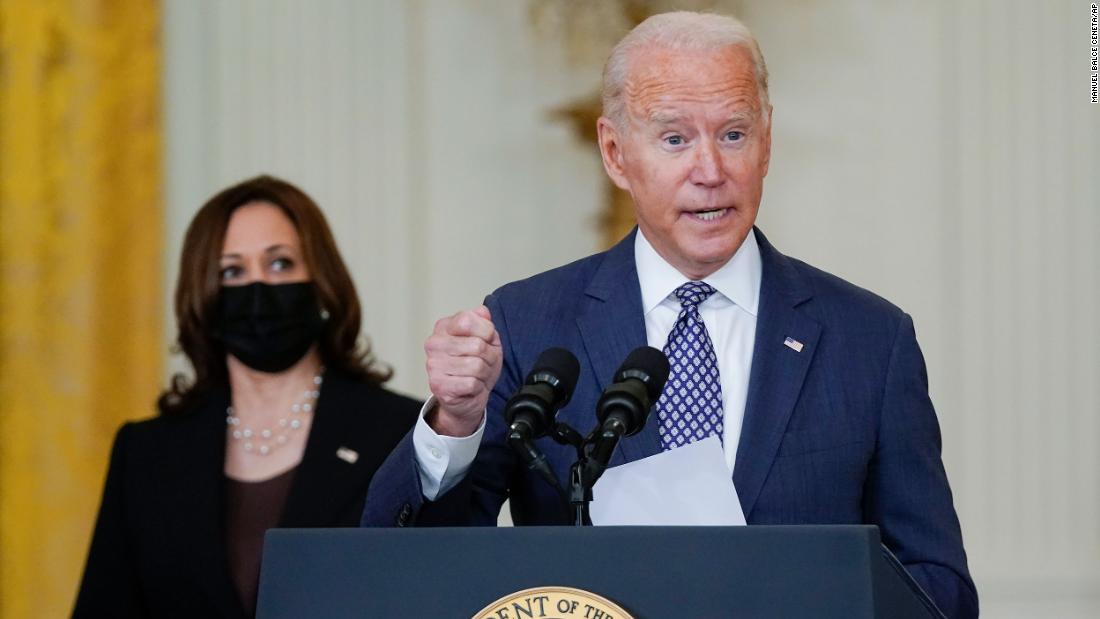
(CNN)Poll of the week: A new AP-NORC poll shows President Joe Biden's approval rating on foreign policy has fallen to 47%, while his approval rating stands at 51%. It's the first time in his presidency that Biden's approval rating on foreign policy is below his disapproval rating in the AP-NORC poll.
The poll comes as other surveys indicated that Biden's overall job approval rating is continuing its month-long decline and has dropped below 50% for the first time in his presidency.
What's the point: Americans have given their initial reaction to how Biden handled the US troop withdrawal from Afghanistan, and it seems to be negative. Whether or not it remains that way is yet to be seen.
The events of the last week demonstrate that how Americans see a politician's leadership still matters even on an issue where most Americans may agree with him. But history says we should be very cautious in predicting too far into the future how these events will ultimately dictate the rest of Biden's presidency.
A month ago, it was difficult to imagine Americans turning against Biden on Afghanistan. A clear majority (55%) of Americans approved of the job Biden was doing with concern to troop withdrawal in Afghanistan in a late July ABC News/Ipsos poll. An even larger 62% indicated that they approved of the decision to withdraw all troops from Afghanistan in a May Quinnipiac University poll.
Indeed, most of the polling we have currently shows that Americans are still in favor of Americans leaving Afghanistan. Only a little more than a third of Americans (35%) said in the AP-NORC poll that the war in Afghanistan was worth fighting.
Biden seems to be losing support not because troop withdrawal is an unpopular position. Rather, Biden is losing support because of the way he's doing the job.
History suggests that America's reaction to Biden was far from unavoidable, even if they didn't like the result.
How Americans viewed the North Vietnamese taking control of Saigon in 1975 is instructive in understanding the shifting political winds today. Time/Yankelovich, Skelly & White polling in 1975 indicated that 52% of Americans had a lot of concern about what happened and another 33% were at least a little concerned.
Americans, though, didn't blame Gerald Ford, the president at the time. In fact, 59% said he deserved none of the blame at all. Just 2% said he deserved the most blame of any of the presidents who led the country during its involvement in Vietnam.
Ford's overall approval rating didn't drop, unlike Biden's.
The difference in how Americans reacted to the fall of Kabul compared to the fall of Saigon is astounding in some ways. Both the Vietnam War and the war in Afghanistan started long before the president who ordered the final troop withdrawals ever took office. Americans wanted to get out of both countries.
They just seemed to think that Biden was far more at fault for the recent developments in Afghanistan than Ford was for what happened in Vietnam in 1975.
Of course, how Americans saw Ford's Vietnam performance didn't predict the 1976 election. Ford lost that race to Jimmy Carter.
The fact that a foreign policy event in 1975 didn't tell us much about the 1976 election isn't surprising when looking at history.
Arguably the most successful war of the last 60 years was the Persian Gulf War during George H.W. Bush's presidency. Bush's performance was rated extremely highly by the American people in 1991. Some pundits at the time went so far to say that Bush reelected himself thanks to the war.
Bush lost reelection in 1992 to Bill Clinton.
On the other end, Ronald Reagan sent American troops to Lebanon in the early 1980s as peacekeepers. Hundreds were killed in a bombing, and Reagan later withdrew the troops. By early 1984, more than 60% of Americans viewed the Reagan policies as a failure in Lebanon.
Reagan easily won reelection later that year.
The point here is that the American public often has a short memory when it comes to foreign policy endeavors. The recent developments in Afghanistan that have hurt Biden in the polls may still be hurting him come the midterms in 2022 or presidential election in 2024. They could just as easily have no impact at all.
"about" - Google News
August 22, 2021 at 03:47AM
https://ift.tt/3kbh0lX
Why Americans may ultimately not care about Biden's Afghanistan performance - CNN
"about" - Google News
https://ift.tt/2MjBJUT
Bagikan Berita Ini














0 Response to "Why Americans may ultimately not care about Biden's Afghanistan performance - CNN"
Post a Comment